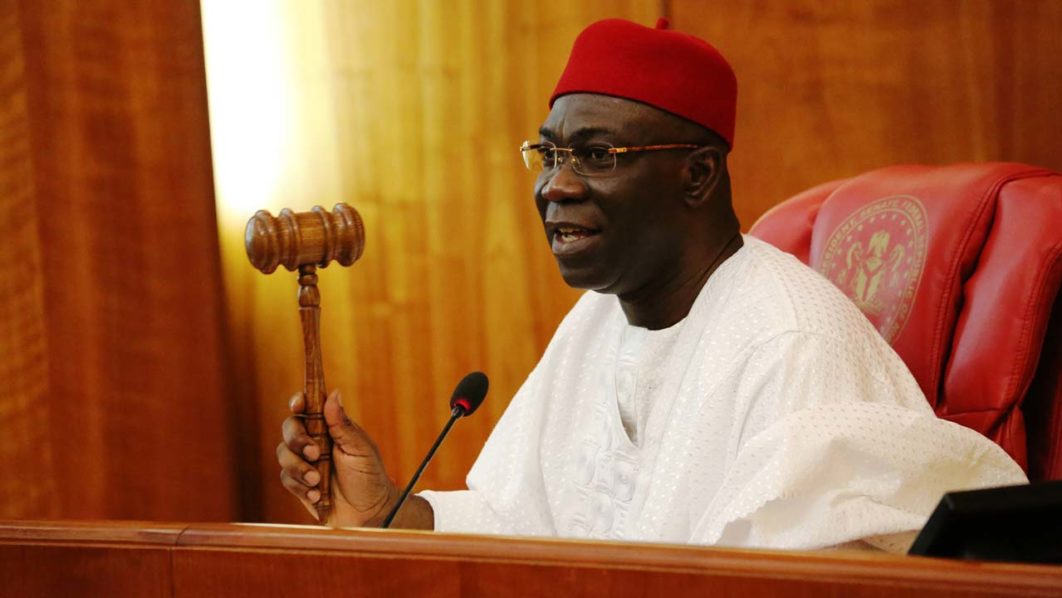- EFCC Detains Ekweremadu Over 22 Properties
The Economic and Financial Crimes Commission has detained Deputy Senate President, Ike Ekweremadu, for alleged fraud and failing to explain how he came to own 22 properties in Nigeria, the United States, the United Kingdom and the United Arab Emirates.
It was learnt that Ekweremadu honoured the invitation of the EFCC around 9 am on Tuesday but was still in custody as of 9 pm.
A top source at the EFCC told our correspondent that the lawmaker had many questions to answer.
“He came in around 9 am and he is still in our custody. He will be released once we have enough information,” the source said.
When contacted around 9 pm, the Spokesman for the EFCC, Mr Wilson Uwujaren, confirmed that Ekweremadu honoured the commission’s invitation on Tuesday. He, however, could not say if the senator was still in custody as of the time of filing this report by 9.30pm.
It was learnt that the Deputy Senate President was under investigation for allegedly owning about 22 properties some of which he failed to declare in his Asset Declaration Form at the Code of Conduct Bureau.
The Federal Government had in March sought an interim order of the Federal High Court, Abuja, to temporarily seize 22 prime properties/assets of Ekweremadu located in London, Dubai, Florida, and Abuja, that were not declared before the CCB.
The motion ex-parte filed by Festus Keyamo (SAN) on behalf of the Special Presidential Investigation Panel for the Recovery of Public Property was brought before the court pursuant to Section 330 of The Administration Of Criminal Justice Act, 2015; Section 8 Of The Recovery Of Public Property (Special Provisions) Act and Section 44 (2)(K) of the 1999 Constitution.
In an affidavit deposed to in support of the motion ex-parte by Yohanna Shankuk, a litigation clerk in Festus Keyamo Chambers, he stated that from 1999 till date, Ekweremadu had been a public officer and had not earned anything outside his salaries and allowances as a public officer.
He, therefore, wondered where the lawmaker got the money to acquire such properties.
The undeclared assets were identified as: 11 Evans Enwerem Street, Apo Legislative Quarters, Apo, Abuja; Plot 2633 Kyami, Abuja; Housing Estate; Plot 1106 CRD, Cadastral Zone 07-07, Lugbe, Abuja; Plot 2782, Asokoro Extension, Abuja; houses at Citi Park Estate, Gwagwalada, Abuja and Plot 1474, Cadastral Zone BD6, Mabushi, Abuja.
Other properties allegedly undeclared by the senator include Congress Court, Abuja; Flat 1, Block D25, Athletics Street, (24th Street), Games Village, Abuja; and Plot 66, 64 Crescent, Gwarimpa Estate, Abuja.
Properties allegedly owned by Ekweremadu abroad include: Flat 4, Varsity Court, Harmer Street, WIH 4NW, London; 52, Ayleston Avenue, NW6 7AB, London; Room 1903, The Address Hotel, Downtown Dubai; The Address Boulevard, 3901, Dubai; two Flats of Burij Side Boulevard (the signature), Dubai and Emirate Gardens Apartment No. EGG1/1/114, Dubai.
Others are Emirate Gardens Apartment No. EGG1/115, Dubai; apartment DFB/12/B 1204, Park Towers, Dubai; Flat 3604, MAG214, Dubai; Villa No 148, Maeen 1, The Lakes Emirates Hills, Dubai; 4507 Stella Street, Bellavida Estate Kissime, Florida, United States; 2747 Club Cortile Circle, Kissime, Florida, US and 2763 Club Cortile Circle, Kissime, Florida, US.
However, the Peoples Democratic Party had decried the alleged harassment of Ekweremadu, opposition leaders, and voices of dissent, by the Federal Government.
The party accused the government of misusing the anti-graft and security agencies close to the 2019 general elections, stressing that such posed a grave threat to the nation’s democracy.
Reacting to what it described as Senator Ekweremadu’s witch-hunt by the EFCC on Tuesday, the party called on the international community to rein in the President Muhammadu Buhari-led administration before it became too late.
In a statement issued by its National Publicity Secretary, Mr Kola Ologbodiyan, in Abuja on Tuesday, the party said, “Just a few days after the EFCC and over 200 policemen practically held Senator Ekweremadu hostage to prevent the defection of the All Progressives Congress senators to the PDP, the EFCC has continued to harass Senator Ike Ekweremadu to cover its shame.
“We wish to remind Nigerians and the international community that this is only the newest in the series of attempts to destroy the senator politically in the run-up to the 2019 general elections.
“It is of grave concern to us that while corruption and corrupt persons abound in the APC, the EFCC prefers to chase after innocent members of the opposition.
“While the likes of Babachir Lawal, Abba Kyari, Ayo Oke, Kemi Adeosun, Abdulrasheed Maina and his accomplices, Okoi Obono-Obla, and scores of others in the ruling APC, with corruption and fraud-related charges, walk free, the anti-graft agencies have continued in its reckless desperation to harass and dent leaders of the opposition in the name of an anti-corruption war that Nigerians and the world have come to see for what it is- persecution of the opposition.
“We warn the Buhari-led administration to desist from this act of highhandedness and witch-hunt of the opposition so as not to torpedo our democracy.
“The panicky APC government cannot be allowed to destroy opposition leaders just a few months to the general elections in the name of fighting corruption.”


 Naira4 weeks ago
Naira4 weeks ago
 Naira3 weeks ago
Naira3 weeks ago


 Naira4 weeks ago
Naira4 weeks ago




 Naira3 weeks ago
Naira3 weeks ago
 Commodities4 weeks ago
Commodities4 weeks ago


 Sport Business4 weeks ago
Sport Business4 weeks ago


 News3 weeks ago
News3 weeks ago


 Banking Sector4 weeks ago
Banking Sector4 weeks ago























